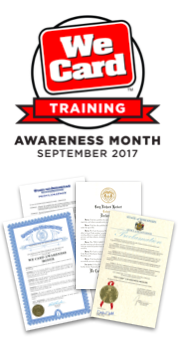Electronic age verification devices take the math out of checking ID. Just swipe the customer's driver's license and the machine does the rest.
Sounds simple.
We Card calendars take the math out checking ID too. For every day of the month, the calendar provides the birth date required for a legal tobacco sale. In other words, if it's Dec. 19, 2009 and the legal age for buying tobacco is 18, then the customer must have a birth date of Dec. 19, 1991 -- or earlier.
But researchers have found that these age verification tools alone don't prevent tobacco sales to minors.
That's because the age verification tools won't solve the underlying problems that keep sales associates from refusing a tobacco sale to minors. The age verification tools don't make the line at the register any shorter. They don't prevent the customer from arguing over a refused sale. And they don't do away with the peer pressure so many younger sales associates feel when checking ID.
Tom Montoya, chief of enforcement with the Wyoming Department of Revenue Liquor Division, recently ordered calendars from We Card. He said that in a rural state like Wyoming, most of the retailers he works with are mom and pop businesses without corporate training offices to back them up. His office distributes calendars as part of an overall training strategy that includes a copy of the state law, templates for policy manuals, counter mats that remind sales associates and customers about the law. Montoya works with liquor retailers, but his training principles apply to tobacco sales too.
"It's got to be a whole process," he said. "I would rather enforce with education than with a heavy hand."
Montoya represents a growing trend among enforcement officers who realize that it's not enough to run stings and issue fines. The best enforcement includes training and tools that help retailers comply with the law.
When electronic age verification devices were first introduced it was assumed that compliance would automatically increase. The devices read a customer's date-of-birth off the magnetic strip on a driver's license and tell the sales associate whether the customer is old enough to buy tobacco or other restricted products.
But a 2001 study by researchers at Brandeis University found that electronic age verification (EAV) devices alone did not improve compliance. The study included compliance checks in two cities, Iowa City and Tallahassee, interviews with retailers and with customers. "Although EAVs may have improved the accuracy of age verification, EAVs did not increase the frequency of age verification," the study concluded. In other words, age verification devices are useful tools, but they don't substitute for training.
Carrie Bence, the deputy director of the Armstrong Indiana Drug and Alcohol Commission recently ordered calendars from We Card as part of a drug free communities program in two counties outside Pittsburgh, Pa. She plans on distributing the calendars to bars and tobacco retailers, but she sees these as tools in an overall training program. Too often, she said, sales associates and bartenders don't bother to check a customer's age but instead assume that if a customer presents ID he must be of age. "You just can't stick a calendar on the counter and expect your employees to know what to do with it without training," Bence said.
The We Card Age of Purchase Calendar is one such useful tool available to retailers. It is one the most popular items available to retailers at wecard.org, and when used in concert with effective training, will help sales associates and their managers identify and prevent sales of tobacco to minors.





